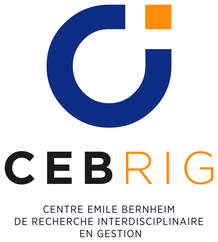RESUME
Jan Mattijs is full professor at Solvay Brussels School of Economics and Management, Université Libre de Bruxelles, where he teaches organizational change and consulting projects skills. His research interests revolve around organizational dynamics, public sector reform and performance in fields like the judiciary, social security and nonprofits. Socio-material arrangements and the effects of technology on work and organizational behaviour are emerging research topics. He also explores the embodiment of management and how personal and social development are connected.
Jan Mattijs est professeur à la Solvay Brussels School of Economics and Management, Université libre de Bruxelles, où il enseigne le changement organisationnel et la conduite de projets d’intervention en entreprise. Ses recherches concernent la théorie des organisations, les réformes administratives et la performance publique dans des secteurs tels que la justice, la sécurité sociale et les organisations non-marchandes. Les dispositifs socio-matériels et les effets de la technologie sur le travail et l’organisation émergent comme nouveaux sujets. Il s'intéresse également à l'enracinement corporel du management afin d'articuler le développement personnel et social face aux enjeux de notre époque.
Jan Mattijs est professeur à la Solvay Brussels School of Economics and Management, Université libre de Bruxelles, où il enseigne le changement organisationnel et la conduite de projets d’intervention en entreprise. Ses recherches concernent la théorie des organisations, les réformes administratives et la performance publique dans des secteurs tels que la justice, la sécurité sociale et les organisations non-marchandes. Les dispositifs socio-matériels et les effets de la technologie sur le travail et l’organisation émergent comme nouveaux sujets. Il s'intéresse également à l'enracinement corporel du management afin d'articuler le développement personnel et social face aux enjeux de notre époque.
RESEARCH FIELDS
Public management | Management control | Organization
Keywords
Performance Management | Government Reform | Organizational Change | Judiciary | Public Administration | Embodiment | Critical Management Studies
most representative publications
- Bernard, B., Drumaux, A., & Mattijs, J. (2011). La justice pénale en prospective : Six scénarios à l’horizon 2020.
- Bruylant. Bernard, B., Drumaux, A., & Mattijs, J. (2014). Opening Up Public Strategic Management : Foresight’s Contribution to Policy Relevance, Cooperation and Consistency. In P. Joyce, J. Bryson, & M. Holzer (Éds.), Developments in Strategic and Public Management (p. 59-72). Palgrave MacMillan. http://hdl.handle.net/2013/
- Deschamps, C., & Mattijs, J. (2018). How Organizational Learning Is Supported by Performance Management Systems : Evidence from a Longitudinal Case Study. Public Performance & Management Review, 41(3), 469-496. https://doi.org/10.1080/15309576.2018.1462213
- Mattijs, J. (2003). Gérer l’équité. L’Harmattan.
- Mattijs, J., & Turc, E. (2019). INTRODUCTION. Crise de légitimité et changement de l’action publique : Des discours aux pratiques. Politiques et Management Public, 36(2), 121-131. http://dx.doi.org.ezproxy.ulb.ac.be/10.3166/pmp.36.2019.0009




